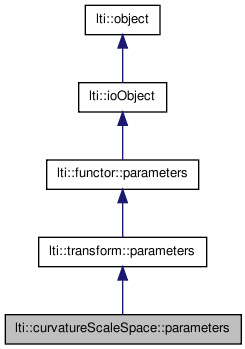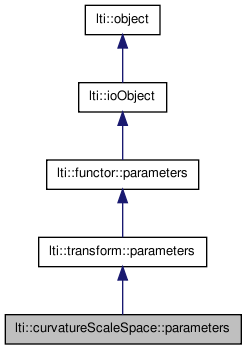

|
latest version v1.9 - last update 10 Apr 2010 |
|
the parameters for the class curvatureScaleSpace More...
#include <ltiCurvatureScaleSpace.h>


Public Member Functions | |
| parameters () | |
| parameters (const parameters &other) | |
| ~parameters () | |
| const char * | getTypeName () const |
| parameters & | copy (const parameters &other) |
| parameters & | operator= (const parameters &other) |
| virtual functor::parameters * | clone () const |
| virtual bool | write (ioHandler &handler, const bool complete=true) const |
| virtual bool | read (ioHandler &handler, const bool complete=true) |
Public Attributes | |
| bool | geometricDelta |
| double | deltaSigma |
| double | startSigma |
| int | gaussianSize |
| int | normLength |
| int | sigmaAxisBlock |
| ubyte | posNegCross |
| ubyte | negPosCross |
| ubyte | nonCross |
| bool | fastMethod |
the parameters for the class curvatureScaleSpace
| lti::curvatureScaleSpace::parameters::parameters | ( | ) |
default constructor
Reimplemented from lti::transform::parameters.
| lti::curvatureScaleSpace::parameters::parameters | ( | const parameters & | other | ) |
copy constructor
| other | the parameters object to be copied |
Reimplemented from lti::transform::parameters.
| lti::curvatureScaleSpace::parameters::~parameters | ( | ) | [virtual] |
destructor
Reimplemented from lti::functor::parameters.
| virtual functor::parameters* lti::curvatureScaleSpace::parameters::clone | ( | ) | const [virtual] |
returns a pointer to a clone of the parameters
Reimplemented from lti::transform::parameters.
| parameters& lti::curvatureScaleSpace::parameters::copy | ( | const parameters & | other | ) |
copy the contents of a parameters object
| other | the parameters object to be copied |
Reimplemented from lti::transform::parameters.
| const char* lti::curvatureScaleSpace::parameters::getTypeName | ( | ) | const [virtual] |
returns name of this type
Reimplemented from lti::transform::parameters.
| parameters& lti::curvatureScaleSpace::parameters::operator= | ( | const parameters & | other | ) |
copy the contents of a parameters object
| other | the parameters object to be copied |
| virtual bool lti::curvatureScaleSpace::parameters::read | ( | ioHandler & | handler, | |
| const bool | complete = true | |||
| ) | [virtual] |
read the parameters from the given ioHandler
| handler | the ioHandler to be used | |
| complete | if true (the default) the enclosing begin/end will be also written, otherwise only the data block will be written. |
Reimplemented from lti::functor::parameters.
| virtual bool lti::curvatureScaleSpace::parameters::write | ( | ioHandler & | handler, | |
| const bool | complete = true | |||
| ) | const [virtual] |
write the parameters in the given ioHandler
| handler | the ioHandler to be used | |
| complete | if true (the default) the enclosing begin/end will be also written, otherwise only the data block will be written. |
Reimplemented from lti::functor::parameters.
Step for the std.
deviation to generate the CSS-image. This value will be added at each step to the previous sigma (if geometricDelta is false) or will be multiplied with the last sigma (if geometricDelta is true). For the last case please ensure that this value is greater than one, otherwise the results will be unpredictable.
Default value: 0.1
If false, the CSS will be computed evolving the x and y components of the border points using the derived gauss kernels.
If true, the components will be first low-pass filtered and after that the resulting vectors will be derived. This second method is much faster but for the geometricDelta mode and for small sigma regions it is not precise. If you need this functor for feature extraction, the fast method will provide you with the maxima of the CSS "blobs" with enough precision. (Default value: true)
Size for the first kernel being used.
Note that this is the first kernel size. As the std. deviation increases, the size of the kernel will be updated automatically. Default value: 9
if geometricDelta is true, the sigma increments will be multiplicative i.e.
sigma(1) = deltaSigma*sigma(0). If false, arithmetical increments will be done, (sigma(1) = deltaSigma + sigma(0) Please note that for the geometricDelta, the deltaSigma should be greater than one to get usefull results!
Default value: false
pixel value in the CSS image for a negative-positive zero crossing.
If you want to extract features, please ensure that this value is different than posNegCross, otherwise the features could be wrong.
(Default: 255)
value for non-zero crossing (background of the CSS image) (Default: 128)
pixel value in the CSS image for a positive-negative zero crossing.
If you want to extract features, please ensure that this value is different than negPosCross, otherwise the features could be wrong.
(Default: 0)